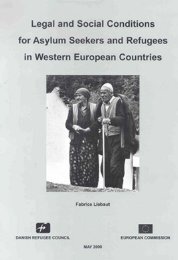Bulgaria - The social impact of seasonal migration
Bulgaria - The social impact of seasonal migration
Bulgaria - The social impact of seasonal migration
You also want an ePaper? Increase the reach of your titles
YUMPU automatically turns print PDFs into web optimized ePapers that Google loves.
7. Conclusions and Recommendations<br />
I. Current <strong>migration</strong> trends differ significantly from the pre-1989 tendencies. As a<br />
whole, from 1880 to 1988, around 1 283 000 people emigrated from <strong>Bulgaria</strong>, while 808<br />
600 immigrated to the country. In that period, in-<strong>migration</strong> included mainly ethnic<br />
<strong>Bulgaria</strong>ns living on the territories <strong>of</strong> neighbouring countries, while the main waves <strong>of</strong><br />
out-<strong>migration</strong> were comprised mostly <strong>of</strong> ethnic minorities living in <strong>Bulgaria</strong>,<br />
predominantly ethnic Turks. <strong>The</strong> main reasons for both out- and in- <strong>migration</strong> were<br />
political. In-<strong>migration</strong> flows now include more refugees and foreign immigrants, while<br />
out-<strong>migration</strong> has no such clearly expressed ethnic pr<strong>of</strong>ile – it is characteristic for all the<br />
ethnic groups inhabiting <strong>Bulgaria</strong> nowadays. <strong>The</strong> main reasons for e<strong>migration</strong> now are<br />
economic.<br />
<strong>The</strong> historical heritage has the following consequences for the current <strong>migration</strong><br />
patterns:<br />
<strong>The</strong> <strong>Bulgaria</strong>n community abroad is quite diversified, including different <strong>social</strong> groups,<br />
with different ethnic origin and different motives for e<strong>migration</strong>. <strong>The</strong> notion <strong>of</strong> different<br />
groups <strong>of</strong> <strong>Bulgaria</strong>ns living abroad has been embedded in the new law on <strong>Bulgaria</strong>ns<br />
living outside <strong>of</strong> <strong>Bulgaria</strong> (<strong>of</strong> 11 April 2000), which introduces the concept <strong>of</strong> "<strong>Bulgaria</strong>n<br />
community abroad". <strong>The</strong> political use <strong>of</strong> the term “<strong>Bulgaria</strong>n community abroad” is<br />
helpful, but for analytical purposes and in the process <strong>of</strong> elaborating concrete policies,<br />
it has to be differentiated in order to explain the specific characteristics <strong>of</strong> the different<br />
groups which ought to be treated in a different political manner. A special emphasis<br />
deserves to be put on new emigrants, whose motives for e<strong>migration</strong> are quite different<br />
from those <strong>of</strong> the old diaspora.<br />
Besides, there is still ethnically specific out-<strong>migration</strong>, as the already existing large<br />
ethnic Turkish diaspora helps a lot the <strong>seasonal</strong> <strong>migration</strong> <strong>of</strong> ethnic Turks currently<br />
living in <strong>Bulgaria</strong>.<br />
In addition, the in-<strong>migration</strong> <strong>of</strong> foreign citizens is a relatively new phenomenon and<br />
needs to be investigated and treated with special attention.<br />
II. One <strong>of</strong> the most important conclusions <strong>of</strong> the study is that there is no precise<br />
unified methodology for observing e<strong>migration</strong> trends. <strong>The</strong>re is an urgent need <strong>of</strong><br />
elaborating such a methodology and establishing <strong>of</strong> a stable, publicly accepted<br />
information database on the processes <strong>of</strong> e<strong>migration</strong> that would be able to take account<br />
<strong>of</strong> the period <strong>of</strong> staying abroad. <strong>The</strong>re are no data about <strong>seasonal</strong> <strong>migration</strong>, let alone<br />
the irregular one. Keeping track <strong>of</strong> the number <strong>of</strong> irregular emigrants is a very difficult<br />
task that requires more efforts and coordination among different institutions, both<br />
<strong>Bulgaria</strong>n and foreign ones. A possible partial solution might be the regular gathering <strong>of</strong><br />
information from the <strong>Bulgaria</strong>n municipalities about the size and destination <strong>of</strong> <strong>seasonal</strong><br />
<strong>migration</strong>.<br />
Data from the national censuses conducted in 1992 and 2001 showed that between these<br />
two censuses approximately 196 000 people emigrated from <strong>Bulgaria</strong>, while the number<br />
<strong>of</strong> persons who have returned or settled to <strong>Bulgaria</strong> was a total <strong>of</strong> 19 000. Net <strong>migration</strong><br />
from <strong>Bulgaria</strong> is negative, amounting to roughly 177 000 people who had left the country<br />
in 1992-2001, or an average <strong>of</strong> 22 000 people leaving <strong>Bulgaria</strong> yearly. Other data – <strong>of</strong> state<br />
81

















